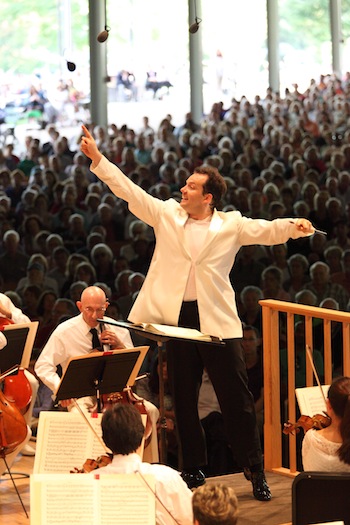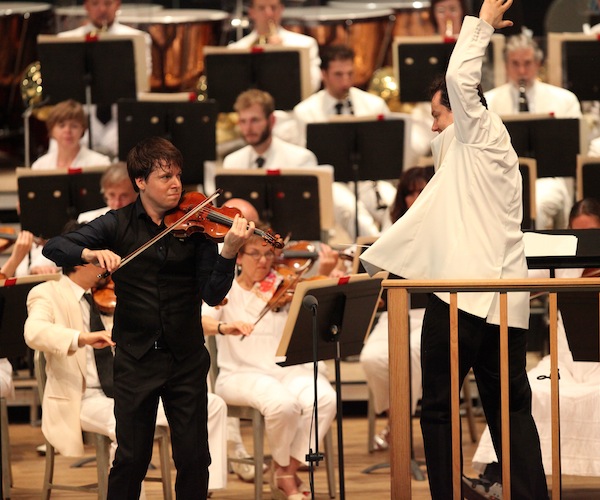Concert Review: Violinist Joshua Bell and Conductor-Designate Andris Nelsons at Tanglewood
To judge from the BSO’s responsive playing and the audience’s enthusiastic responses, director-designate Andris Nelsons can’t do much wrong these days. Of course, a decade ago, neither could James Levine and we all know how that relationship turned out.
By Jonathan Blumhofer
In an interview a couple of weeks ago with the Berkshire Eagle, Boston Symphony Orchestra (BSO) music director-designate Andris Nelsons spoke with some first-hand understanding on the challenges of getting young families to attend concerts at Tanglewood (he and his wife, soprano Kristine Opolais, have a toddler). Presumably, then, he was heartened to see and hear the lawn teeming with children and their parents at Sunday afternoon’s matinee, which concluded Nelsons’ weeklong summer residency in Lenox.
And why wouldn’t you want to bring your family to Tanglewood on Sunday? The weather was glorious. Joshua Bell was playing Lalo’s Symphonie espagnole. The program closed with Beethoven’s Fifth Symphony. It was, as regards programming, a family-friendly event, well in line with the “get to know you” feel of Nelsons’ forthcoming Symphony Hall season.
Much of his discussion with the Eagle followed along that vein, and not all of it reads happily: in the course of the conversation, Nelsons made some frustratingly timid comments about the role of contemporary music and how he might program it. This is a department to which former BSO music director James Levine didn’t bring nearly enough variety, but Levine was at least unashamed about presenting new music he believed in; one can only hope that, in coming years, Nelsons doesn’t simply play it safe and hedge his bets on safe repertoire that is his bread and butter.
To his credit, in his recent Tanglewood dates, Nelsons hasn’t been shying away from more accessible recent fare. I’m not familiar with Rolf Martinson’s Bridge (heard on Saturday night), but Christopher Rouse’s Rapture, which opened Sunday’s concert, is among the better of that latter kind: engaging, well-crafted, occasionally tuneful, and often filled with memorable gestures. Currently composer-in-residence for the New York Philharmonic, Rouse is, at heart, a traditionalist. His music is often driven by technical procedures that wouldn’t have been unfamiliar to Beethoven. But he tempers that grounding with extensive knowledge of contemporary techniques and forms of music, especially rock-‘n-roll.
The rock influence isn’t as apparent in Rapture as it is in, say, Bonham, but it does crop up in some of the former’s thundering timpani riffs. Otherwise, Rapture is an extended essay depicting what Rouse describes as “a progression to an ever more blinding ecstasy.” It opens slowly, with rich, Mahlerian horn calls. Various soloists enter as the piece picks up in tempo and energy; a series of climaxes culminates in a radiant F major chord.
Sunday’s performance captured many of the piece’s shifting colors and convincingly laid out Rapture’s dramatic narrative. Parts of it could have been tidier: the exposed, fast string playing sounded a bit ragged and some balances in the contrapuntal sections were muddy. But, given the limited rehearsal time the BSO gets at Tanglewood and the unfamiliarity of this score (the orchestra only played it once before, in August 2005), these things are almost to be expected. I wouldn’t mind hearing it again in the friendlier confines of Symphony Hall.
Eduardo Lalo’s Symphonie espagnole hasn’t turned up on a Tanglewood program since, remarkably, 1989. The soloist on that concert, also remarkably, was Joshua Bell. Not looking or sounding a day older this Sunday, Bell brought his trademark sweet tone and supple phrasing to a piece that, in less musical hands, can simply be a display vehicle.
To be sure, there were plenty of acrobatics to witness as well as, in the first two movements, a couple of patches of surprisingly sour intonation. But at the heart of Bell’s performance was a musical line that sang, oftentimes quite beautifully.

Sunday’s concert proved an enticing set-up for what should be an energizing start to the Nelsons era. Photo: Hilary Scott.
Nelsons guided the BSO through a charismatic, snappy accompaniment that was appropriately Spanish-tinged. With Bell, the ensemble was at its best in the third and fourth movements. The former sounded beguilingly seductive, its charm enhanced by a couple of subtle, well-placed shifts of tempo. And the latter, arguably the weightiest movement of the Symphonie, was charged with a healthy dose of electricity and sense of musical drama.
What new revelations might yet be mined from Beethoven’s Fifth? Based Sunday’s solid, sometimes inspiring, performance, the piece doesn’t hold many expressive secrets but its durability is profoundly impressive and it still can thrill.
Nelsons presided over a straightforward reading of this landmark score. The first movement thundered, though it lacked a genuine sense of terror: too few of the music’s manic extremes were as sharply differentiated as they might have been. Dynamic contrasts were strongly accentuated in the third movement but here the tempo felt too deliberate and sluggish.
The second movement, though, sounded both natural and – in all the right ways – strange, Nelsons emphasizing the music’s form primarily through a strict adherence to articulation and instrumental color. And, short of bad playing, there’s really no way to ruin this finale. Sunday’s blazed with agreeable warmth and stately triumph.
To judge from the BSO’s responsive playing and the audience’s enthusiastic responses, Nelsons can’t do much wrong these days. Of course, a decade ago, neither could James Levine and we all know how that relationship turned out. But things do feel different this time around and Sunday’s concert proved an enticing set-up for what should be an energizing start to the Nelsons era.
Jonathan Blumhofer is a composer and violist who has been active in the greater Boston area since 2004. His music has received numerous awards and been performed by various ensembles, including the American Composers Orchestra, Kiev Philharmonic, Camerata Chicago, Xanthos Ensemble, and Juventas New Music Group. Since receiving his doctorate from Boston University in 2010, Jon has taught at Clark University, Worcester Polytechnic Institute, and online for the University of Phoenix, in addition to writing music criticism for the Worcester Telegram & Gazette.
Tagged: Andris Nelsons, Boston Symphony Orchestra, Joshua Bell

